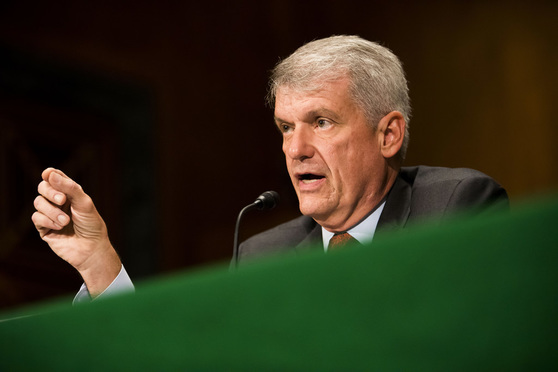Wells Fargo President and CEO Tim Sloan received a bipartisan grilling Tuesday over the bank’s “egregious” consumer abuses spanning more than a decade, with House Financial Services Committee Chairwoman Maxine Waters, D-Calif., stating that Wells Fargo is a “recidivist financial institution that creates widespread harm with a broad range of offenses.”
During the heated committee hearing, dubbed “Holding Megabanks Accountable: An Examination of Wells Fargo’s Pattern of Consumer Abuses,” Waters stated that Wells Fargo’s “misconduct appears to persist,” citing an article published Saturday in The New York Times stating that the bank’s employees “continue to see internal rule breaking to meet aggressive sales goals.”
Sloan told the committee, however, that during his more than two years as CEO, the bank has “gone above and beyond what is required in disclosing these issues in our public filings, we have worked to remedy these issues, and, most importantly, we have worked to address root causes that allowed them to occur in the first place. As a result, Wells Fargo is a better bank than it was three years ago, and we are working every day to become even better.”
Wells Fargo, Sloan added, is “equally committed to preventing new problems from developing. To do that, we have transformed our approach to risk management by fundamentally changing the organization of Wells Fargo.”
Waters noted the “unprecedented” 2018 Federal Reserve Board asset cap on the bank’s growth, which remains in place today. The cap, along with punishments and fines, Water stated, “have not changed the bank’s behavior,” and Wells Fargo continues to rake in huge profits. (The bank made a profit of $6.1 billion in the fourth quarter, beating expectations, but has shed more than 1,000 advisors since the scandal became public in 2016.)
Sloan’s testimony, however, did not alleviate Raymond James analysts’ concerns, who maintain their underperform rating. The “fallout from the account opening scandal will not end near-term, pushing-out expectations for a recovery,” the analysts said, adding that they believe “revenue continues to decline and profitability metrics remain below-peer.”
Negative headlines, the analysts said, “will continue to cause hesitation by potential customers from doing business with Wells, and place Wells at a competitive disadvantage in keeping and attracting bankers.”
Regulators, Waters continued, also refuse “to take forceful actions against the bank, but instead are weakening Dodd-Frank safeguards protecting consumers and the economy from large firms like Wells Fargo.”
Stated Waters: “Wells Fargo’s ongoing lawlessness and failure to right the ship suggest that the bank, with approximately $1.9 trillion in assets and serving one in three U.S. households, is simply too big to manage.”
Rep. Patrick Henry, R-N.C., ranking member on the committee, noted “all sorts of mismanagement and misconduct” at the bank for several years now, citing the news on Monday that Wells Fargo Advisors was among 79 advisors reaching settlements to return $125 million in 12b-1 fees to clients under the Securities and Exchange Commission’s Share Class Initiative.
(See a timeline of Wells Fargo’s scandals)
“Be assured this is not the end of the conversation,” McHenry said. “This is an important hearing, and you’ll hear bipartisan criticism of the actions you have taken and the failures that you have overseen under your watch.”
‘Too big to manage?’
“Given the unprecedented nature of the Federal Reserve growth restriction, which remains in place today, is Wells Fargo simply too big to manage?” Waters asked.
Replied Sloan: “No, we’re not,” noting the changes he’s instituted “in terms of fundamentally reorganizing the company, centralizing our risk and control functions.”
Waters noted the continued problems for Wells Fargo, and probed Sloan on what other changes besides downsizing could be effective. “I believe that Wells Fargo serves our 70 million customers, one out of three U.S. households, in a very effective way today,” Sloan replied.
McHenry noted that Wells Fargo has been fined by “every one” of its federal regulators, and has entered into consent decrees with “every one” of them. “How many consent decrees total have you entered into?” he asked.
Approximately “14 that are open right now,” Sloan responded.
“You’re the CEO of a major American company — does the buck stop with you?” McHenry asked.
Replied Sloan: “Absolutely.”
“How are you changing that front-line culture?” McHenry probed further.
Replied Sloan: “In our retail banking business, we’ve changed the leadership, we ended the incentive plan that drove inappropriate behavior, we increased the amount of training that we give to our team members … we’ve improved the products and services.”
— Related on ThinkAdvisor:
- The Story Behind Wells Fargo’s Troubles
- When Will Wells Fargo’s Scandals End?
- Wells Fargo Unleashes ‘Category Killer’ Succession Program
NOT FOR REPRINT
© 2024 ALM Global, LLC, All Rights Reserved. Request academic re-use from www.copyright.com. All other uses, submit a request to [email protected]. For more information visit Asset & Logo Licensing.


 Wells Fargo CEO Tim Sloan. (Photo: Diego Radzinschi/ALM)
Wells Fargo CEO Tim Sloan. (Photo: Diego Radzinschi/ALM)





